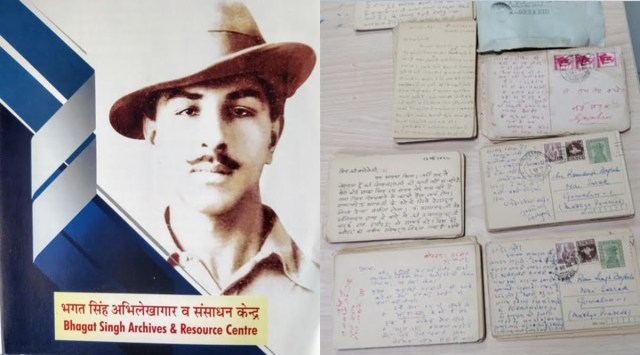Stay updated with the latest - Click here to follow us on Instagram
Behind creation of Bhagat Singh Archives, a long battle against rejection
With Delhi government allocating Rs 10 crore budget to activities relating to Bhagat Singh in a year, Bhagat Singh Archives and Resource Centre hopes to get some regular funding and minimum regular staff, to continue and expand its scope and activities.
 A signage identifying Bhagat Singh Archives, and (right) letters and other materials written by Singh. (Express Photo by Chaman Lal)
A signage identifying Bhagat Singh Archives, and (right) letters and other materials written by Singh. (Express Photo by Chaman Lal)The original proposal to set up Bhagat Singh Archives was to be a part of Bhagat Singh Chair in Jawaharlal Nehru University, New Delhi, for which I, with support from many eminent scholars, had campaigned during Bhagat Singh birth centenary in 2006-07. I was the president of JNU Teachers Association (JNUTA) at that time. The Government of India, led by Manmohan Singh, had set up national committees to commemorate two anniversaries of Bhagat Singh — the Bhagat Singh 75th Martyrdom Anniversary in 2006, and Bhagat Singh Centenary Birth Anniversary in 2007, along with few other anniversaries like 60 years of Independence, 150 years of first war of Independence and Tilak Anniversary. Proposals from the Universities were invited and I was only one from JNU faculty to send proposal of Bhagat Singh Chair. It was accepted by the ministry and Chair was allotted to JNU, which further allotted it to Centre for Historical Studies (CHS) with my consent in 2008.
 Bhagat Singh Archives, with collection of records of freedom struggle from 1757 Plassey War against East India Company, to Independence in 1947 was to be part of this archives. I had a personal collection of about 2,000 books, many archival documents from British Library, London; National Archives of India and few state archives, original letters of revolutionaries among others which I was willing to part with for setting up this archive as part of Bhagat Singh Chair. This was first Chair in the name of Bhagat Singh, and till now the only one in the country. Irony is that this Chair has never been filled since last 14 years, and only very few lectures have been held on behalf of the Chair. At the time of my retirement in 2012 end, I tried my best to gift my collection for setting up Bhagat Singh Archives in JNU. The then Vice Chancellor Prof S K Sopory was supportive and three eminent historians — Prof Romila Thapar, Prof J S Grewal and late Prof Sabyasachi Bhattacharya sent their recommendations to JNU for setting up this archives based on my collection. Ironically my own progressive colleagues in JNU did not cooperate and asked me to donate the collection to PC Joshi Archives, which was set up in 1973, for which not only JNU paid more than Rs 3 lakh, to buy the books and other material, PC Joshi himself was made whole time director with salary and campus accommodation.
Bhagat Singh Archives, with collection of records of freedom struggle from 1757 Plassey War against East India Company, to Independence in 1947 was to be part of this archives. I had a personal collection of about 2,000 books, many archival documents from British Library, London; National Archives of India and few state archives, original letters of revolutionaries among others which I was willing to part with for setting up this archive as part of Bhagat Singh Chair. This was first Chair in the name of Bhagat Singh, and till now the only one in the country. Irony is that this Chair has never been filled since last 14 years, and only very few lectures have been held on behalf of the Chair. At the time of my retirement in 2012 end, I tried my best to gift my collection for setting up Bhagat Singh Archives in JNU. The then Vice Chancellor Prof S K Sopory was supportive and three eminent historians — Prof Romila Thapar, Prof J S Grewal and late Prof Sabyasachi Bhattacharya sent their recommendations to JNU for setting up this archives based on my collection. Ironically my own progressive colleagues in JNU did not cooperate and asked me to donate the collection to PC Joshi Archives, which was set up in 1973, for which not only JNU paid more than Rs 3 lakh, to buy the books and other material, PC Joshi himself was made whole time director with salary and campus accommodation.
My conditions were simple, no paid or administrative position, no price for collection, but lifelong association and an office in honorary advisory position. Neither JNU library agreed to spare a room, where PC Joshi archives was and is located, nor any CHS or School of Social Sciences agreed to spare a room, though many of Deans were from progressive background. I refused to donate my collection to PC Joshi Archives as in my view Bhagat Singh was a more important name than PC Joshi in Indian political history. New administration of JNU, after 1916, took the PC Joshi Archives out of CHS control and merged it in JNU Library.
After I failed to get a positive response from my alma mater and workplace, I looked outside JNU, but in Delhi itself, as I wished that scholars from India and abroad can have better access to these sources for research and study in national capital, than in any other place in India. That time I planned to meet Delhi Deputy Chief Minister Manish Sisodia, along with Abhitej Singh Sandhu, grandnephew of Bhagat Singh. Unfortunately, Abhitej, a young activist of Aam Aadmi Party (AAP), died in a tragic accident in Himachal Pradesh. Then Atishi Marlena, who is daughter of historian couple and Left scholar activists Dr Vijay Singh and Dr Tripta Wahi, offered to help setting up Bhagat Singh Archives in Delhi government;’s Delhi Archives complex, which is very close to JNU and which I had visited and found academically suitable for this purpose.
So, after a meeting with Sisodia along with Atishi and Abhinandita Mathur, then cultural advisor to Delhi government, the plan to set up Bhagat Singh Archives was approved and a legal contract was signed, which granted access to Archives for general public and scholars and I was to act as honorary advisor for life time with office support. An advisory board at my suggestion was set up which included eminent historians from different universities like Prof Irfan Habib from AMU, Prof Salil Mishra from Ambedkar University, Prof S Irfan Habib, Prof. Amar Farooqui and few others along with a nephew of Bhagat Singh — Abhey Singh Sandhu. This Archive was inaugurated by Delhi minister Gopal Roy on March 23, 2018 with a two-day national seminar on Bhagat Singh, in which scholars from across India participated. Bhagat Singh Archives is supposed to hold minimum two functions in a year on birth and death anniversaries of Bhagat Singh on September 28 and March 23, respectively. The meeting of the advisory panel is to be held frequently to chalk out new programme.
With Delhi government allocating Rs 10 crore budget to activities relating to Bhagat Singh in a year, Bhagat Singh Archives and Resource Centre hopes to get some regular funding and minimum regular staff, to continue and expand its scope and activities for spreading the great revolutionary’s ideas and authentic historic knowledge for public and scholars.
The author is a retired professor from JNU and Honorary Advisor to Bhagat Singh Archives and Resource Centre, Delhi Archives, Govt of NCT Delhi.







